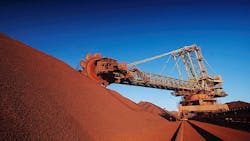BHP Billiton Profit Plunges 29.5% to $10.88 Billion
SYDNEY -- Citing slowing global growth and commodity price volatility, mining giant BHP Billiton (IW 1000/54) on Tuesday said net profit slumped 29.5% to $10.88 billion in the year to June.
The world's biggest miner said lower prices for its key resources, including a 17% dive in iron ore, wiped $8.9 billion from underlying earnings of $28.4 billion.
"BHP Billiton delivered robust financial results in the 2013 financial year, a period characterized by slowing global growth and volatile commodity markets," the miner said.
"Economic conditions over the second half of the 2013 financial year were affected by lower-than-expected growth in emerging economies," it added.
"Weaker trade and soft manufacturing activity pulled growth rates slightly below expectations in China."
New CEO Andrew Mackenzie said softer Chinese trade and manufacturing data "provide evidence of the transition underway in their economy" but BHP was "confident of GDP growth in China of 7%-8%."
"In the next 15 years we expect global demand for commodities to grow by up to 75%," he said. As demand patterns evolve, given our commodity exposure across steelmaking, metals, energy and food, we are very well positioned, but we cannot be complacent."
His remarks came as BHP separately unveiled a $2.6 billion investment in its Jansen potash project in Canada, underscoring efforts to diversify its portfolio as the Asia-driven mining boom slows.
BHP said it had managed to cut costs by $2.7 billion in the year ended June 30, but that was more than offset by the significant fall in commodity prices.
It saw a 7% increase in total production across its businesses, including a 13th consecutive annual output record at its flagship Pilbara iron ore operation in Western Australia. But the company said the value of its products was "substantially" down over the year.
Iron ore prices were 17% lower, costing BHP $4.1 billion, and steelmaking and energy coal both declined, wiping a further $3.7 billion off the bottom line.
Oversupply in the nickel and aluminum markets and concerns of a near-term rebalancing in the copper sector had weighed on metals prices, reducing earnings by around $1.0 billion.
BHP said it expected increased supply across the commodities market to continue pushing down prices in the short term, but the balance should right itself "in time.”
“ The growth rates for steel demand in Asia are expected to moderate as the Chinese economy gradually rebalances. This rebalancing should support growth in demand for other industrial metals, energy and agricultural products," it said.
"We expect the rebalancing of the Chinese economy to be significant in terms of the nature of domestic demand as well as the types of goods and services the economy will produce," BHP added.
"We also see India and Southeast Asia as significant sources of economic growth in the long term."
Following last year's 34.8% slump in annual profit to $15.42 billion, BHP said it had approved no major growth projects in 2013 and was targeting a cut in capital expenditure to $16.2 billion in 2014.
BHP's petroleum production grew 6% to 236 million barrels of oil equivalent, and was forecast to increase to 250 million barrels in 2014.
Western Australia iron ore output expanded 7% to 187 million tons and BHP forecast that would rise another 10% in 2014 to 207 million tons.
Steelmaking coal output was 38 million tons -- an increase of 13% -- while energy coal was up three percent at 73 million tons. Forecasts for 2014 were, respectively, 41 million and 73 million tons.
-Amy Coopes, AFP
Copyright Agence France-Presse, 2013
About the Author
Agence France-Presse
Copyright Agence France-Presse, 2002-2025. AFP text, photos, graphics and logos shall not be reproduced, published, broadcast, rewritten for broadcast or publication or redistributed directly or indirectly in any medium. AFP shall not be held liable for any delays, inaccuracies, errors or omissions in any AFP content, or for any actions taken in consequence.
